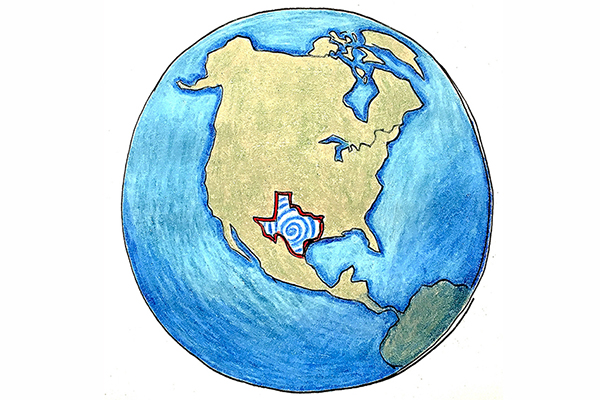Hurricane Harvey unleashed record-breaking amounts of rain on Texas, followed by a whirlwind of debates about climate change.
While most scientists agree that climate change induces severe weather events such as hurricanes, many concede that it is virtually impossible to connect a single weather event to something as far-reaching as global warming.
UT research scientist Charles Jackson said hurricanes feed off thermal energy in the ocean when sea surface temperatures are the warmest. He added that this heat causes the air to hold more moisture, which produces more intense thunderstorms and high precipitation rates.
“It was fairly remarkable that Harvey went from a tropical storm to a category four hurricane very rapidly just before it hit the shore,” Jackson said. “Warmer sea surface temperatures contribute to that type of thing. We don’t quite know what the role of climate change was in Harvey, but certainly we expect future storms to become more intense because of global warming. This is consistent to what we expect.”
Hurricane Harvey’s unique intensity for the area serves as proof that climate change is involved, according to Melinda Taylor, UT law senior lecturer and expert on environmental defense. Hurricane Harvey made landfall as a category four hurricane at Rockport, Texas with winds nearing 130 mph. In addition to the rapid intensification of the storm, its distinctive stationery behavior made the storm especially devastating.
Taylor said the hurricane’s devastation is a sign of connection to climate change.
“I think it’s worth paying attention to that the storm was intensifying so quickly,” Taylor said. “It’s impossible to look at one particular heat wave and say this one event is a result of climate change, but these types of events are consistent with what the climate models say will happen. Personally, I think climate change played a role in Harvey, probably in magnifying the intensity. We just don’t see that rain in a climate like South Texas very often.”
Severe weather events like Harvey have increased, and the National Climate Assessment predicts they will continue to increase. According to their climate model, rainfall rates increase about 20 percent for hurricanes in a warmer climate.
Hurricane Irma, which hit the Caribbean island of Barbuda Tuesday night as a category five hurricane, is another intense storm that formed over warmer-than-average water, but Jackson said it’s difficult to prove a link between rising sea temperatures and frequency of hurricanes.
“Hurricane frequency is a more difficult science question since it deals with the propensity of future weather to organize itself into a hurricane,” Jackson said. “We do not have clear understanding about what to expect about how expected changes in climate will affect hurricane frequency.”
Severe hurricanes have happened in the past at Harvey’s level of intensity. In 1900, Galveston, Texas, experienced a category four hurricane with storm tides ranging from eight to 15 feet. History junior Robert Pavlovic said history tells us that climate change probably did not affect Hurricane Harvey.
“I think huge natural disasters with devastating effects occur from time to time, and there’s been events in the past that were just as major,” Pavlovic said. “I’m not a climate change denier, and I think many other natural disasters can probably be caused by climate change, but this storm didn’t seem like anything particularly out of the ordinary.”
Despite the massive devastation Hurricane Harvey caused, Jackson said we can learn from these events in order to prepare for the increase in severe weather.
“Even without climate change, as a society, we need to adapt and develop ways of protecting ourselves,” Jackson said. “Certainly, there are lots of things we can do to prepare … there are a lot of things that we have learned. The things you would do to prepare for climate change are not different than what you would do in response to a big event like this.”















